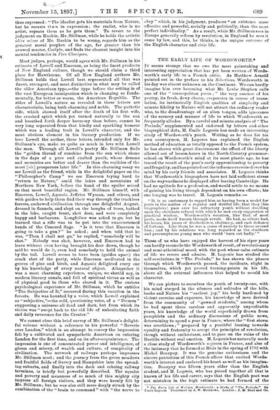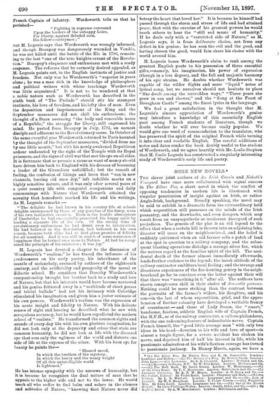THE EARLY LIFE OF WORDSWORTH.*
IT seems strange that we owe the most painstaking and) interesting appreciation that has yet been written of Words- worth's early life to a French critic. As Matthew Arnold pointed out in the preface to his Selections, Wordsworth in his day was almost unknown on the Continent. We can hardly imagine him ever becoming what Mr. Leslie Stephen calls one of the " cosmopolitan poets ; " the very essence of his poetry, its fresh, dewy charm, evaporates in course of trans-
lation, its intrinsically English qualities of simplicity and minute fidelity to Nature will not attract the ordinary reader who, to the disadvantage of an alien tongue, adds ignorance of the scenery and manner of life to which Wordsworth so frequently alludes. By a careful and minute analysis of "The Prelude," supplemented and endorsed by letters and other biographical data, M. Emile Legonis has made an interesting study of Wordsworth's youth. Writing as he does for his own countrymen, M. Legonis has explained the English. method of education as totally opposed to the French system, he has shown with great discernment the effect of the liberty allowed out of lesson-hours in the North-Country grammar- school on Wordsworth's mind at its most plastic age, he has traced the result of the poet's early apprenticeship to poverty and frugality, and has pointed out the influence exercised over his mind by his early friends and associates. M. Legouis thinks that Wordsworth's biographers have not laid sufficient stress on the waywardness he displayed after leaving Cambridge. He had no aptitude for a profession, and would settle to no means of gaining his living though dependent on his own efforts ; hie one longing was to travel. M. Legonis remarks :—
"It is so customary to regard him as having been a model for poets in the matter of a regular and dutiful life, that they [ila biographers] pass over his refractory youth without dwelling upon the obstinate refusal with which he met every suggestion of practical wisdom. Wordsworth's vocation, like that of most poets, made itself known through revolt. He had, as others had, his hours, his years of disobedience, obstinacy, and rash defiance of fortune. Like them he was a cause of anxiety to those around him ; and by his relations was long regarded as the stubborn and presumptuous young man who would 'turn out badly.' "
Those of us who have enjoyed the harvest of his riper years can hardly reconcile the Wordsworth of revolt, of revolutionary and semi-atheistical mood, with the poet whose calm estimate of life we revere and admire. M. Legouis has studied the self-revelations in "The Prelude," he has shown the phases through which Wordsworth passed, the incidents, slight in themselves, which yet proved turning-points in his life, above all the external influences that helped to mould his character.
We can picture to ourselves the youth of twenty-one, with his mind steeped in the silences and solitudes of the hills, books and Nature his "earliest joy," his body hardened by violent exercise and exposure, his knowledge of men derived from the community of "gowned students," among whom he had spent three careless and apparently unprofitable years, his knowledge of the world superficially drawn from pamphlets and the ordinary discussions of public news, determining to spend a year in France, where the " first storm was overblown ; " prepared by a youthful leaning towards equality and fraternity to accept the principles of revolution, though without enthusiasm, and to gaze on the ruins of the Bastille without real emotion. M. Legouis has naturally made a close study of Wordsworth's sojourn in France, and also of the intimacy that he formed at Blois in the spring of 1792 with Michel Beanpny. It was the genuine enthusiasm and the sincere patriotism of this French officer that excited Words- worth's interest and enslaved his heart as well as his imagina- tion. Beanpuy was fifteen years older than the English student, and M. Legouis, who has pieced together all that is known of his life and career, says that the English poet was not mistaken in the high estimate he had formed of the
• The Early Life of William Wordsworth: a IRA/ of "The Prelude." By traile Legoais. Translated by J. W. Matthews. London : J. M. Dent and Clo.
French Captain of infantry. Wordsworth tells us that he
perished-
" Fighting in supreme command Upon the borders of the unhappy Loire, For liberty, against deluded men, His fellow-countrymen ; "
but M. Legouis says that Wordsworth was wrongly informed, and though Beaupuy was dangerously wounded in Vendee, he was not killed until the battle of the Elz in 1796, remain- ing to the last "one of the true knights-errant of the Revolu- tion." Beaupny's eloquence and enthusiasm met with a ready response. The reforms that he earnestly desired appealed, as
M. Legouis points out, to the English instincts of justice and freedom. Not only was he Wordsworth's "superior in years alone ; he was a man rich in the knowledge of philosophers and political writers with whose teachings Wordsworth was little acquainted." It is not to be wondered at that a noble nature such as Wordsworth has described in the ninth book of "The Prelude" should stir his strongest instincts, his love of freedom, and his lofty idea of man. Even the deposition and imprisonment of the King and the September massacres did not chill his enthusiasm ; the thought of a State assuming "the body and venerable name of a Republic," the struggle for liberty, still engrossed his mind. He parted from Beaupny in July, 1792, an earnest disciple and adherent to the Revolutionary cause. In October of the same eventful year Wordsworth returned to Paris haunted by the thought of the September massacres, "divided from me by one little month," but with his newly awakened Republican ardour undaunted by the sight of the Temple with its Royal prisoners, and the signs of civil war that met his eye on all sides. It is fortunate that so prosaic a cause as want of money should have driven him back to England with his dreams of becoming a leader of the Girondists unfulfilled ; but the tumult of feeling, the confusion of likings and loves that "ran in new channels, leaving old ones dry," left indelible marks on a highly sensitive nature, and it was only after several years of a quiet country life with congenial companions and daily communings with Nature that Wordsworth attained the serenity that henceforth marked his life and his writings.
As M. Legouis remarks :—
" The delights he had known in his country life at school, delights unsurpassed by those of any paradise of the fancy, were of his own instinctive creatien. Even in the hostile atmosphere of Cambridge he had successfully preserved his happy spirit by leading a separate life of his own. Of the strong wine of revolutionary enthusiasm he had drunk even to intoxication. He had believed in the Revolution, had believed in his own reason, because both alike had at first given promise of felicity for all mankind. And it was still in search of some assurance of happiness that he turned once more to Nature. At last he recog- nised the principle of his existence ; it was joy."
M. Legouis has devoted a chapter to the discussion of Wordsworth's "realism," he has traced the influence of his predecessors on his early poetry, his inheritance of the mantle of melancholy, assumed by authors of the eighteenth century, and the artificiality and pomposity of the moral or didactic school. He considers that Dorothy Wordsworth's companionship brought her brother back to a study and love of Nature, but that his interests would have become narrowed and his genius frittered away in a "multitude of short poems and trivial ballads" had not his intimacy with Coleridge stimulated his imagination and given him a juster estimate of his own powers. Wordsworth's realism was the expression of his acute insight and fidelity to Nature. With his delicate senses of sight and hearing he described what he saw with scrupulous accuracy, but he would have repudiated the modern school of "realists." He transformed the common sights and sounds of every-day life with his own glorious imagination, he did not look only at the depravity and crime that stain our common humanity, he did not look at life with the diseased eye that sees only the ugliness of the world and distorts one side of life at the expense of the other. With his keen eye for beauty he paints the- " Blessed mood, In which the burthen of the mystery, In which the heavy and the weary weight Of all this unintelligible world
Is lightened."
He has intense sympathy with the sorrows of humanity, but it is because he recognises the dual nature of man that he appeals to the higher side and not to the lower. He would teach all who suffer to find balm and solace in the silences and solitudes of Nature, "knowing that Nature never did betray the heart that loved her." It is because he himself had passed through the storm and stress of life and had attained peace, that with the exercise of his greatest powers he would teach others to hear the "still sad music of humanity." If he deals only with a "restricted side of Nature," as M. Legouis says, it is from deliberate choice, not from any defect in his genius ; he has seen the evil and the good, and having chosen the good, would fain share his choice with the world around him.
M. Legouis bases Wordsworth's claim to rank among the greatest English poets to his possession of three essential gifts,—namely, his imagination, his power of expression (though in a less degree), and the fall and majestic harmony of his epic strains. He doubts whether Wordsworth was capable of the wilder flights and more "liquid" notes of lyrical song, but we ourselves should not hesitate to place "She dwelt among the nntrodden ways," "Three years she grew in sun and shower," and the "Song at the Feast of Brougham Castle" among the finest lyrics in the language.
We feel a great satisfaction in the thought that M. Legouis's sincere appreciation of Wordsworth's genius may introduce a knowledge of this essentially English poet among French students of literature, though we doubt whether he will ever become really popular. We would give one word of commendation to the translator, who has preserved the spirit of the original French while turning it into clear and readable English. The careful additions of notes and dates render the book doubly useful to the student of Wordsworth, and we agree heartily with Mr. Leslie Stephen that M. Emile Legouis has constructed a singularly interesting study of Wordsworth's early life and poetry.







































 Previous page
Previous page